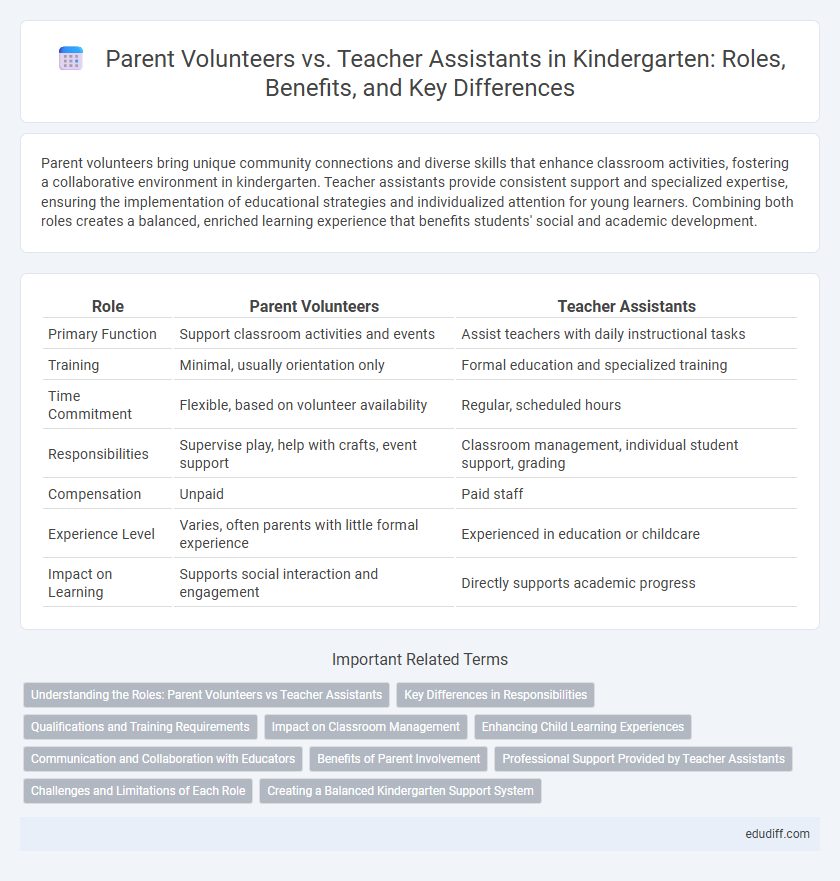Parent volunteers bring unique community connections and diverse skills that enhance classroom activities, fostering a collaborative environment in kindergarten. Teacher assistants provide consistent support and specialized expertise, ensuring the implementation of educational strategies and individualized attention for young learners. Combining both roles creates a balanced, enriched learning experience that benefits students' social and academic development.
Table of Comparison
| Role | Parent Volunteers | Teacher Assistants |
|---|---|---|
| Primary Function | Support classroom activities and events | Assist teachers with daily instructional tasks |
| Training | Minimal, usually orientation only | Formal education and specialized training |
| Time Commitment | Flexible, based on volunteer availability | Regular, scheduled hours |
| Responsibilities | Supervise play, help with crafts, event support | Classroom management, individual student support, grading |
| Compensation | Unpaid | Paid staff |
| Experience Level | Varies, often parents with little formal experience | Experienced in education or childcare |
| Impact on Learning | Supports social interaction and engagement | Directly supports academic progress |
Understanding the Roles: Parent Volunteers vs Teacher Assistants
Parent volunteers in kindergarten primarily support classroom activities, organize events, and provide additional supervision, offering flexible, non-professional assistance. Teacher assistants, however, have specific training to deliver instructional support, manage small groups, and assist with individualized student needs, playing a crucial role in the educational process. Understanding these distinct roles helps optimize collaboration and enrich the learning environment for young children.
Key Differences in Responsibilities
Parent volunteers in kindergarten primarily support special events, classroom activities, and individual student assistance on a temporary or part-time basis, enhancing the learning environment without formal educational duties. Teacher assistants have consistent, structured responsibilities including helping with lesson implementation, managing classroom behavior, and supporting students with special needs under the teacher's supervision. The key difference lies in the formal training and ongoing commitment required of teacher assistants compared to the flexible, intermittent involvement of parent volunteers.
Qualifications and Training Requirements
Parent volunteers in kindergarten typically offer support without formal qualifications or extensive training, relying on their willingness to assist in classroom activities. Teacher assistants, in contrast, are often required to possess specific educational credentials and complete specialized training programs that equip them with instructional techniques and child development knowledge. These structured qualifications enable teacher assistants to provide more consistent and effective support to lead teachers and students.
Impact on Classroom Management
Parent volunteers often bring diverse skills and additional support that enhance classroom engagement and behavior monitoring, fostering a positive learning environment. Teacher assistants provide consistent, trained assistance, facilitating smoother transitions and individualized attention that improves student focus and reduces disruptions. Both roles significantly contribute to effective classroom management by supporting teachers in maintaining order and promoting student participation.
Enhancing Child Learning Experiences
Parent volunteers provide personalized attention and community engagement that enrich classroom interactions, while teacher assistants bring professional training and consistent support to structured learning activities. Both roles enhance child learning experiences by fostering collaboration, individual guidance, and reinforcing educational goals tailored to kindergarten development standards. Integrating parent volunteers and teacher assistants creates a balanced environment that promotes social skills, academic growth, and emotional well-being for young learners.
Communication and Collaboration with Educators
Parent volunteers enhance classroom support by fostering open communication and building strong relationships with educators, contributing personal insights and reinforcing learning at home. Teacher assistants serve as consistent partners in daily activities, facilitating direct collaboration with teachers to implement lesson plans and manage classroom dynamics effectively. Both play vital roles in supporting student development through complementary communication channels and cooperative efforts with educators.
Benefits of Parent Involvement
Parent volunteers enhance kindergarten classrooms by fostering a supportive learning environment and increasing adult-to-child interaction, which boosts student engagement and social development. Their involvement creates stronger school-family connections, encouraging communication and collaboration that positively impact children's academic and emotional growth. Engaging parents as volunteers also provides diverse perspectives and resources, enriching the educational experience beyond traditional teacher assistant roles.
Professional Support Provided by Teacher Assistants
Teacher assistants in kindergarten provide essential professional support by implementing individualized learning plans and managing classroom activities, ensuring a structured educational environment. They possess specialized training to assist with developmental assessments and adapt teaching methods to meet diverse student needs. Unlike parent volunteers, teacher assistants contribute consistent, pedagogically informed assistance that enhances overall instructional quality.
Challenges and Limitations of Each Role
Parent volunteers in kindergarten bring enthusiasm and community support but face time constraints and limited training, which can hinder classroom consistency. Teacher assistants offer professional experience and daily reliability but may have restricted roles due to school policies and lack of formal teaching authority. Both roles require clear boundaries and collaboration to address their unique limitations for effective classroom support.
Creating a Balanced Kindergarten Support System
Parent volunteers bring diverse community involvement and flexible support to the kindergarten environment, enriching children's social and emotional learning experiences. Teacher assistants offer consistent, specialized classroom assistance and contribute to individualized instruction and classroom management. Combining parent volunteers with dedicated teacher assistants creates a balanced kindergarten support system that maximizes educational outcomes and fosters a nurturing learning atmosphere.
Parent Volunteers vs Teacher Assistants Infographic

 edudiff.com
edudiff.com